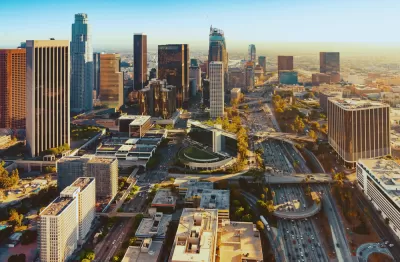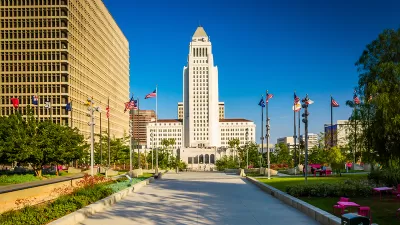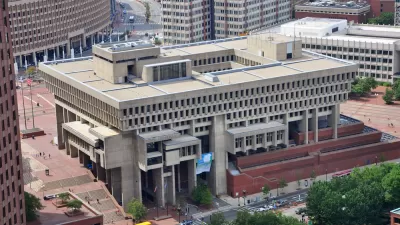Some high-profile projects, including a 77-story tower, hang in the balance of a federal corruption case, but it's unclear whether Los Angeles can undo the approvals, whether they were achieved through bribes or not.

Emily Alpert Reyes reports on the fallout from the federal corruption charges against former Los Angeles City Councilmember Jose Huizar, who oversaw a period of rapid development in the urban core of the city.
The question now: What happens to the projects approved by illegal means?
"It is unclear, however, what might happen to the as-yet unbuilt skyscrapers planned by the executives who allegedly provided those bribes," writes Alpert Reyes. "Several council members have called for the city to reassess approvals for real estate projects mentioned in the criminal case, arguing that the building plans have been tainted by the scandal."
There's a long list of factors that will decide the answer to these questions, such as "how far along developers are in the building process, what kind of approvals they have obtained, and what can be proved about the alleged bribery in the federal case," according to sources cited in the article.
In the meantime, the projects in question are also apparent, although they aren't specifically mentioned in any publicly available records.
- A 20-story residential tower planned at the corner of Hill Street and Olympic Boulevard.
- Plans to replace the Luxe City Center Hotel across from the L.A. Live entertainment complex with new towers.
- A 77-story skyscraper proposed for property occupied by the L.A. Grand Hotel Downtown on Figueroa Street.
- A 35-story tower being built in the Arts District.
Another contributing factor: none of the developers pursuing any of the projects have been charged with any crimes. More details and implications of these considerations are available in the source article.
FULL STORY: Developers allegedly bribed an L.A. councilman. What happens to their building plans?

Planetizen Federal Action Tracker
A weekly monitor of how Trump’s orders and actions are impacting planners and planning in America.

Maui's Vacation Rental Debate Turns Ugly
Verbal attacks, misinformation campaigns and fistfights plague a high-stakes debate to convert thousands of vacation rentals into long-term housing.

Restaurant Patios Were a Pandemic Win — Why Were They so Hard to Keep?
Social distancing requirements and changes in travel patterns prompted cities to pilot new uses for street and sidewalk space. Then it got complicated.

In California Battle of Housing vs. Environment, Housing Just Won
A new state law significantly limits the power of CEQA, an environmental review law that served as a powerful tool for blocking new development.

Boulder Eliminates Parking Minimums Citywide
Officials estimate the cost of building a single underground parking space at up to $100,000.

Orange County, Florida Adopts Largest US “Sprawl Repair” Code
The ‘Orange Code’ seeks to rectify decades of sprawl-inducing, car-oriented development.
Urban Design for Planners 1: Software Tools
This six-course series explores essential urban design concepts using open source software and equips planners with the tools they need to participate fully in the urban design process.
Planning for Universal Design
Learn the tools for implementing Universal Design in planning regulations.
Heyer Gruel & Associates PA
JM Goldson LLC
Custer County Colorado
City of Camden Redevelopment Agency
City of Astoria
Transportation Research & Education Center (TREC) at Portland State University
Jefferson Parish Government
Camden Redevelopment Agency
City of Claremont





























